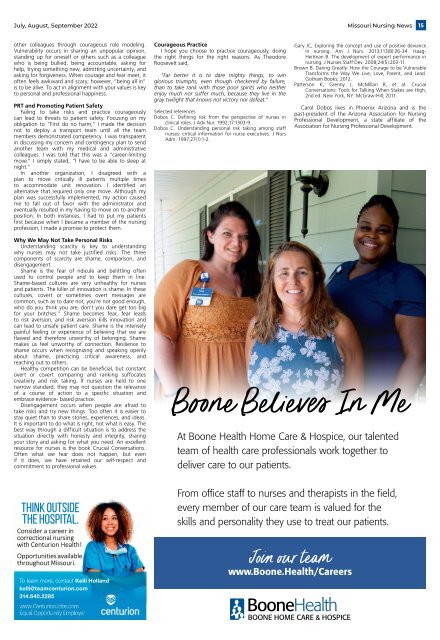Missouri Nurse News - July 2022
You also want an ePaper? Increase the reach of your titles
YUMPU automatically turns print PDFs into web optimized ePapers that Google loves.
<strong>July</strong>, August, September <strong>2022</strong> <strong>Missouri</strong> Nursing <strong>News</strong> 15<br />
other colleagues through courageous role modeling.<br />
Vulnerability occurs in sharing an unpopular opinion,<br />
standing up for oneself or others such as a colleague<br />
who is being bullied, being accountable, asking for<br />
help, trying something new, admitting uncertainty, and<br />
asking for forgiveness. When courage and fear meet, it<br />
often feels awkward and scary; however, “being all in”<br />
is to be alive. To act in alignment with your values is key<br />
to personal and professional happiness.<br />
PRT and Promoting Patient Safety<br />
Failing to take risks and practice courageously<br />
can lead to threats to patient safety. Focusing on my<br />
obligation to “First do no harm,” I made the decision<br />
not to deploy a transport team until all the team<br />
members demonstrated competency. I was transparent<br />
in discussing my concern and contingency plan to send<br />
another team with my medical and administrative<br />
colleagues. I was told that this was a “career-limiting<br />
move.” I simply stated, “I have to be able to sleep at<br />
night.”<br />
In another organization, I disagreed with a<br />
plan to move critically ill patients multiple times<br />
to accommodate unit renovation. I identified an<br />
alternative that required only one move. Although my<br />
plan was successfully implemented, my action caused<br />
me to fall out of favor with the administrator and<br />
eventually resulted in my having to move on to another<br />
position. In both instances, I had to put my patients<br />
first because when I became a member of the nursing<br />
profession, I made a promise to protect them.<br />
Why We May Not Take Personal Risks<br />
Understanding scarcity is key to understanding<br />
why nurses may not take justified risks. The three<br />
components of scarcity are shame, comparison, and<br />
disengagement.<br />
Shame is the fear of ridicule and belittling often<br />
used to control people and to keep them in line.<br />
Shame-based cultures are very unhealthy for nurses<br />
and patients. The killer of innovation is shame. In these<br />
cultures, covert or sometimes overt messages are<br />
common, such as to dare not, you’re not good enough,<br />
who do you think you are, don’t you dare get too big<br />
for your britches.” Shame becomes fear, fear leads<br />
to risk aversion, and risk aversion kills innovation and<br />
can lead to unsafe patient care. Shame is the intensely<br />
painful feeling or experience of believing that we are<br />
flawed and therefore unworthy of belonging. Shame<br />
makes us feel unworthy of connection. Resilience to<br />
shame occurs when recognizing and speaking openly<br />
about shame, practicing critical awareness, and<br />
reaching out to others.<br />
Healthy competition can be beneficial, but constant<br />
overt or covert comparing and ranking suffocates<br />
creativity and risk taking. If nurses are held to one<br />
narrow standard, they may not question the relevance<br />
of a course of action to a specific situation and<br />
embrace evidence- based practice.<br />
Disengagement occurs when people are afraid to<br />
take risks and try new things. Too often it is easier to<br />
stay quiet than to share stories, experiences, and ideas.<br />
It is important to do what is right, not what is easy. The<br />
best way through a difficult situation is to address the<br />
situation directly with honesty and integrity, sharing<br />
your story and asking for what you need. An excellent<br />
resource for nurses is the book Crucial Conversations.<br />
Often what we fear does not happen, but even<br />
if it does, we have retained our self-respect and<br />
commitment to professional values.<br />
Courageous Practice<br />
I hope you choose to practice courageously, doing<br />
the right things for the right reasons. As Theodore<br />
Roosevelt said,<br />
“Far better it is to dare mighty things, to win<br />
glorious triumphs, even though checkered by failure,<br />
than to take rank with those poor spirits who neither<br />
enjoy much nor suffer much, because they live in the<br />
gray twilight that knows not victory nor defeat.”<br />
Selected references<br />
Dobos C. Defining risk from the perspective of nurses in<br />
clinical roles. J Adv Nur. 1992;17:1303-9.<br />
Dobos C. Understanding personal risk taking among staff<br />
nurses: critical information for nurse executives. J Nurs<br />
Adm. 1997;27(1):1-2.<br />
Gary JC, Exploring the concept and use of positive deviance<br />
in nursing. Am J Nurs. 2013;113(8):26-34. Haag-<br />
Heitman B. The development of expert performance in<br />
nursing. J <strong>Nurse</strong>s Staff Dev. 2008;24(5):203-11.<br />
Brown B. Daring Greatly: How the Courage to be Vulnerable<br />
Transforms the Way We Live, Love, Parent, and Lead.<br />
Gotham Books; 2012.<br />
Patterson K, Grenny J, McMillan R, et al. Crucial<br />
Conversations: Tools for Talking When Stakes are High,<br />
2nd ed. New York, NY: McGraw-Hill; 2011.<br />
Carol Dobos lives in Phoenix Arizona and is the<br />
past-president of the Arizona Association for Nursing<br />
Professional Development, a state affiliate of the<br />
Association for Nursing Professional Development.<br />
To learn more, contact Kelli Holland<br />
kelli@teamcenturion.com<br />
314.640.2285

















